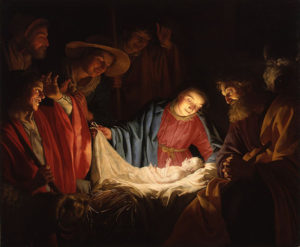Do a web search or open any study Bible and it is pretty clear what Christians believe God wants from you, but what is it that God wants for you? Jesus provides an answer in his parable of the good shepherd: “I came that they may have life, and have it abundantly.” That Jesus is speaking of spiritual rather than material realities should be clear when we consider the evidence of his own life.

Gerard van Honthorst, “Adoration of the Shepherds”
For the One born in a manger, abundant life “does not consist in the abundance of possessions.” Neither does it consist of a multitude of friends, social prominence or freedom from affliction. From birth, our Savior was intended to be “a suffering servant,” a “man of sorrows, and acquainted with grief.” Just eight days into Jesus’ life the “righteous and devout” Simeon revealed to Mary that “a sword will pierce your own soul too.”
So what then is this “abundant life” of which Jesus speaks? Abundant life is authentic life; it is living into the promise of God’s creation of humanity in God’s own image. It is sharing in the copious blessings of God’s own life. God became human so that those who follow Christ “… may become participants of the divine nature.” In his writings on 2 Peter Irenaeus (c. AD 130-220) wrote: God “became what we are in order to make us what God is.” Abundant life, authentic life, eternal life is ours when we accept God’s “…precious and very great promises …” embodied in the birth of our Savior.
That is what God wants for each of us – not only at Christmas – but every day of our lives.
The great Advent and Christmas hymns of Western Christian tradition celebrate the birth of Jesus by focusing on that from which Christ saves us. “He comes to break oppression, to set the captive free.” He brings the light of redemption into the world, releasing us “from our fears and sins” that “the powers of hell may vanish as the darkness clears away.” Few of our familiar hymns meditate on that destiny for which God saves us.
Will you accept God’s Christmas gift to you?
Will you embrace God’s desire for your life in the coming year?
-Pastor Derek French
Bible quotes referenced from John 10:10; Luke 12:15; Isaiah 53; Luke 2:35; Genesis 1:27; 2 Peter 1:4.
